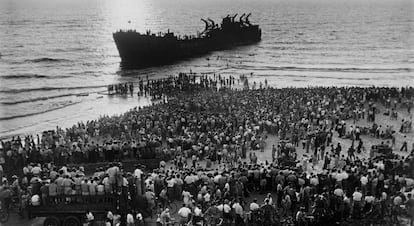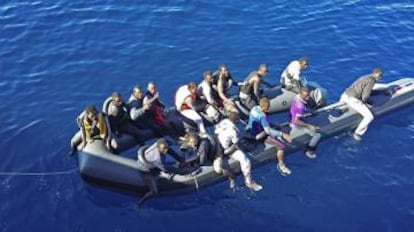A sea of diasporas
The Mediterranean has been a principal meeting point for the three Abrahamic religions of Judaism, Christianity and Islam

The Mediterranean has been a principal meeting point for the three Abrahamic religions of Judaism, Christianity and Islam, and interaction between members of these three faiths has been regular and at times intense – sometimes hostile, but often creative.
Although it is tempting to think about the Crusades, or about the great Spanish-Turkish wars of the 16th century, as proof of the lack of peaceful integration in the Mediterranean, we can also find plenty of evidence for long calm interludes during which Christian and Jewish merchants established themselves in trading colonies along the coast of North Africa and the Levant, and consumers in western Europe eagerly bought eastern goods obtained from or through the Mediterranean – silks and sugar from the Mediterranean, spices brought up the Red Sea into the Mediterranean.
Trading communities from Venice, Genoa, Florence and Barcelona built the commercial institutions we know today – banks, insurance, maritime law – to serve the interests of their trade networks that encompassed the Mediterranean. Religious barriers did not have to be commercial barriers.
We can all see, indeed we see virtually every day, that the disparities in wealth between the northern and southern shores of the Mediterranean have stimulated an intensive, illicit and perilous human traffic across the sea that seems impossible to control
There are also stories of expulsion, notably the forced departure of the Spanish Jews in 1492 and of the Spanish Muslims in 1609. All this created a series of diasporas around the shores of the Mediterranean; cosmopolitan port cities emerged that acted as hosts to mixed communities of people of many religions, ethnic origins and cultural outlooks.
Thessaloniki was home to a diverse population, including the descendants of Jews expelled from Spain, who were living alongside Greeks, Turks, Slavs and others; these Jews continued to speak Spanish into modern times. The extreme case of a cosmopolitan Mediterranean city is Alexandria, founded by Alexander the Great in the fourth century BC.
Early in the 20th century, Europeans accounted for 15% of its population, even if it was they who exercised most of the economic power; in 1927 there were about 49,000 Greeks in the city and 24,000 Italians. Overlapping with various nationalities there were 25,000 Jews. Influential Muslim families, including the royal family, hailed from Turkey, Albania, Syria or Lebanon.
They, as much as the settlers of European descent, wished to identify strongly with European, particularly French, culture. Indeed, a 19th-century ruler of Egypt, Ismail Pasha, expressed the view that ‘Egypt must become part of Europe’ (one wonders how well that view would go down in Brussels today!)
Sign up for our newsletter
EL PAÍS English Edition has launched a weekly newsletter. Sign up today to receive a selection of our best stories in your inbox every Saturday morning. For full details about how to subscribe, click
Nationalist movements within the multi-ethnic Ottoman Empire, beginning in 19th-century Greece, challenged this pluralistic outlook. In an age of rising nationalism, one city after another was transformed by expulsion, flight from danger, forced assimilation, and even mass extermination (in the case of the Sephardim of Thessaloniki, over 40,000 were victims of Nazi murder), and by the 1950’s the port cities of the eastern Mediterranean had largely ceased to be places of coexistence. The one exception was Beirut, but there too tensions kept erupting.
The Turks had exercised nominal sovereignty in North Africa for centuries, but by the 19th century this was being replaced by direct colonial rule on the part of competing powers based in western Europe: a small corner in the far west for Spain, large tracts for France and Italy, with Britain exercising overwhelming influence in Egypt.
In the era of colonialism, starting with the French conquest of Algeria in 1830, a new rapport was created across the Mediterranean, a hegemonic one that insisted on the more ‘civilized’ character of the northerners as opposed to the inhabitants of its southern shores. By 1881, when a French protectorate was created in Tunisia, the region already contained 70,000 Italian settlers, many from Sicily, and 12,000 settlers from the tiny island of Malta.
By the time of decolonization, following World War II, the European colonies in North Africa were home to one and a half million settlers from France, Spain, Italy and elsewhere, with well over a million in Algeria alone. Yet the colonists’ descendants were to depart back to Europe in the second half of the 20th century, along with large numbers of indigenous inhabitants, many of whom then settled on the northern shores of the Mediterranean, above all in southern France. Deadly tensions generated in North Africa during the era of decolonization were then transferred to cities such as Nice and Marseilles.
A 19th-century ruler of Egypt, Ismail Pasha, expressed the view that ‘Egypt must become part of Europe’ (one wonders how well that view would go down in Brussels today!)
The emancipation of the colonized from the colonizers in the second half of the 20th century has had several important effects, most notably the fracturing of the Mediterranean into northern and southern zones that to a large extent operate apart from one another. Places such as Algiers and Alexandria, once celebrated for their meeting of cultures, religions and peoples, have become monochrome cities inhabited solely by the majority population of the interior.
To say this is not to defend the actions of the colonizers which were, notably in Algeria, often brutal and counter-productive. The Jews, in particular, disappeared from all those lands in the Mediterranean where they had formed an integral and highly productive part of a larger society, migrating to one embattled corner (Israel), or sometimes to France, bringing to an end a 2,000-year history of diaspora around the shores of the Mediterranean.
Seen from this perspective, the creation of Israel was another episode in the fragmentation of the Mediterranean into national entities, as different ethnic and religious groups carved out their own territories, and peoples were shunted around, beginning with the Greeks and the Turks in the population exchanges of the 1920’s.
As we are now discovering, the process still continues, following the disintegration of a Syrian state in which a variety of religious groups had some degree of official protection. The disappearance of the Christian communities in Syria marks the end of another 2,000-year history, not of diaspora but of stability, and the beginning of yet another diaspora extending far beyond the Mediterranean.

We can all see, indeed we see virtually every day, that the disparities in wealth between the northern and southern shores of the Mediterranean have stimulated an intensive, illicit and perilous human traffic across the sea that seems impossible to control. This traffic, we need to remind ourselves, was already flowing strongly before the collapse of Syria and the persecutions in Iraq and further east.
The Mediterranean has become the theatre in which many migrants from Black Africa have tried, often at the risk of their life, to enter the wealthy lands of the European Union. Massive improvements in healthcare in sub-Saharan Africa have led to a population explosion; tremendous leaps forward in education have raised aspirations among those who find that their home country cannot satisfy these ambitions. Therefore Black African migration northwards is certain to grow, even more so as climate change threatens livelihoods in the savannah regions.
The lesson of all this is that the countries on the northern shores of the Mediterranean need to connect once again with their neighbours to the south, no longer as colonial masters but as partners. This will not resolve the problem of migration, but it would mark the first stage in making it manageable.
David Abulafia teaches history at Cambridge University and has written The Great Sea: A Human History of the Mediterranean
Tu suscripción se está usando en otro dispositivo
¿Quieres añadir otro usuario a tu suscripción?
Si continúas leyendo en este dispositivo, no se podrá leer en el otro.
FlechaTu suscripción se está usando en otro dispositivo y solo puedes acceder a EL PAÍS desde un dispositivo a la vez.
Si quieres compartir tu cuenta, cambia tu suscripción a la modalidad Premium, así podrás añadir otro usuario. Cada uno accederá con su propia cuenta de email, lo que os permitirá personalizar vuestra experiencia en EL PAÍS.
¿Tienes una suscripción de empresa? Accede aquí para contratar más cuentas.
En el caso de no saber quién está usando tu cuenta, te recomendamos cambiar tu contraseña aquí.
Si decides continuar compartiendo tu cuenta, este mensaje se mostrará en tu dispositivo y en el de la otra persona que está usando tu cuenta de forma indefinida, afectando a tu experiencia de lectura. Puedes consultar aquí los términos y condiciones de la suscripción digital.








































